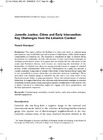Juvenile justice, crime and early intervention: key challenges from the Limerick context (Pre-published version)
Citation
Hourigan, N. (2012) 'Juvenile justice, crime and early intervention: key challenges from the Limerick context.' Irish Probation Journal 9, pp. 63-73.
Hourigan, N. (2012) 'Juvenile justice, crime and early intervention: key challenges from the Limerick context.' Irish Probation Journal 9, pp. 63-73.
Abstract
This paper outlines the findings of a three-year study on criminal gang participation, anti-social behaviour and systems of intimidation within disadvantaged communities in Limerick city. The research is considered in light of debates about motivations for criminality and the effectiveness of early intervention strategies in tackling juvenile justice issues. It is argued that the despite the fact that much social, youth and Probation Service work focuses on convincing the individual of the irrationality of criminal acts, there are strong rational reasons to engage in criminal activity within contemporary Irish society. Participation in a gang can provide a socially excluded young man or woman with a form of fear-based political status that is very powerful in a society where they are otherwise viewed as ‘scumbags’. Those associated with criminal gangs in Limerick city also had a very clear vision of the financial rewards linked to gang participation. Given this rational aspect of criminal behaviour, it is argued that those who advocate early intervention strategies as a means of tackling juvenile justice issues must given greater consideration to the reasons why a family enmeshed in criminality might not engage with these programmes and develop appropriate responses.
Keywords
Criminal gangRationality
Juvenile justice
Early intervention strategies
Familial engagement


